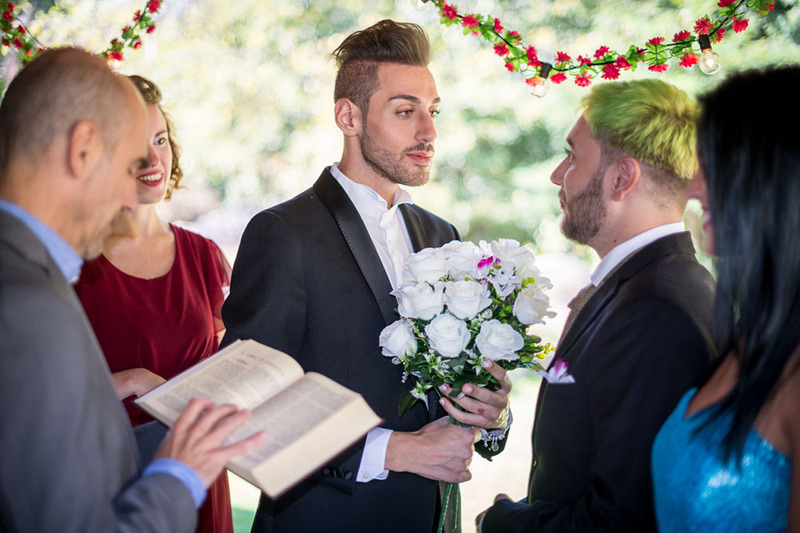AMERICAN WEDDINGS BLOG
Stay up to date with the latest wedding ceremony trends, script writing inspiration, tips and advice for first-time officiants, and news that matters to couples and wedding ministers.
Stay up to date with the latest wedding ceremony trends, script writing inspiration, tips and advice for first-time officiants, and news that matters to couples and wedding ministers.
Published Wednesday, Mar. 27th, 2024
Last updated Thursday, Mar. 28th, 2024

Listen now:
Have you been asked to officiate a wedding for the first time? Are you pursuing a new calling as a wedding minister? Don’t worry – you don’t have to figure out the entire wedding day on your own!
Weddings are a team sport – a collaboration between marriers and officiants, and between officiants and other wedding vendors.
Everyone involved has a unique role to play on the wedding day, and many of these roles rely on others to make the celebration a shining success: Couples bring the marriage license and the love; officiants lead the ceremony; DJs bring the jams; bartenders and caterers make sure guests have a memorable meal, and so on. And making sure all of these parts come together seamlessly, is the wedding planner…
If you’ve been asked to officiate for a couple who’s hired a wedding planner – it’s time to count your lucky stars!
Wedding planners and wedding coordinators are absolute rockstars in the industry, helping couples bring their perfect dream wedding to life from start to finish. There are different types of wedding planners who oversee a varying degree of details, but in general, these professionals help couples budget, design, and execute their wedding day. They can also connect couples with other vendors they trust to do a great job… including officiants.
This means you really want to be on a wedding planner’s good side. Having a great relationship with the wedding planner can lead to a happier couple, fewer ceremony mishaps, and future client referrals.
Related: Why Every Wedding Planner Should Get Ordained (With American Marriage Ministries)
With that in mind, AMM reached out to industry veteran Cindy Savage for advice on how new and first time officiants can work well with the wedding planner.
Cindy is a professional officiant and wedding planner, and the owner of Aisle Less Traveled, an LGBTQ+ wedding planning business based in Seattle. She has a background in theater and design, and specializes in inclusive, fun weddings for modern marriers, and is ordained with American Marriage Ministries.
Cindy’s experience working both beside and behind the altar give her valuable insight into the relationship between officiant and planner, and how these roles can work best together.
Here’s what she told us!
(Quotes lightly edited for clarity and length.)
If a wedding planner sends you an email, texts you, or calls you on the phone – respond promptly! Good communication is crucial to a seamless and stress-free wedding day, and not responding will cost you referrals in the future. Officiants and planners might talk only once or twice before the big day, so make those interactions count.
“Sometimes it’s a huge pain in the ass to get people to respond to emails…” Cindy says, although she’s quick to point out that wedding officiants aren’t any worse at this than other vendors.
“Most [planners], we're often hired in a wedding management or day-of coordination capacity, which means that our clients are planning the wedding and we are coming in at the end to make sure everything's shipshape and to confirm all the details. Part of that process is reaching out to all the vendors and making sure they have the timeline, and the phone numbers, and all that.”
And honestly, [communication] is the thing that will mean I do or don't recommend you in the future. If you're not going to respond to my emails in a timely fashion, and I have to follow up with you two or three times… I'm not going to recommend you.”
If you attend a wedding rehearsal, meet with the planner when you arrive to talk about who will lead which parts of the rehearsal. In general, officiants will lead the ceremony portion of the rehearsal, helping couples understand where to stand and move, and when it will be their time to speak. Don’t be afraid to let the planner know your preferences – it’s all about teamwork.
“As a planner, I try to make a little game plan with the officiant when we first arrive [at the rehearsal] and just chat briefly about how I like to run a rehearsal, and if that’s cool with them,” Cindy says. “And if there's anything they prefer to do, I'm flexible on the preferences of the officiant because the ceremony is their territory.”
It’s important to note: Some officiants attend the wedding rehearsal, and some don’t. And most professional officiants will attend a rehearsal as an ‘add-on’ to their services, charging extra for their time at the rehearsal. We recommend that first-time officiants attend the rehearsal to be better prepared for the big day – it will only last an hour or so, and you’ll learn a lot.
Related: Advice for Officiants: All About Wedding Ceremony Rehearsals

Photo: franckreporter / iStock
What are the final words of the ceremony? Let the planner know what to listen for to cue the recessional music!
Tell the wedding planner the last words you’ll say at the end of the ceremony, so that they know when the recessional music is supposed to start. This will help the DJ hit their mark, ensuring a smooth, cinematic ceremony exit.
Some officiants share their entire wedding ceremony script with the wedding planner before the ceremony. Cindy says this is helpful, but not necessary – as long as she knows the final words to listen for, that signal the ceremony is over.
“I don't care if you give me a whole script, I really don't,” Cindy says. “The main thing I need is, what’s going to be the very last thing that you say? Like, is the kiss the last thing? Are you doing a pronouncement afterwards? What's the last word – because I want to make sure that the DJ knows when to start the music.”
The average wedding ceremony is about 20 minutes long, and planners coordinate other parts of the wedding day around this block of time. That’s why it’s essential to start a ceremony on time, and let the planner know if it will be much shorter, or much longer, than 20 minutes.
Planning a quick 5 minute ceremony? Tell the planner! Does your ceremony clock in at 30 minutes because of multiple readings or unity rituals? Tell the planner! Your ceremony can be whatever length the couple wants, just make sure other vendors know.
Cindy gives a great example of why ceremony timing matters:
“One time, a couple had their friend officiate, and they literally went to the front of the room and said, ‘Welcome, everyone. So-and-so, do you take so-and-so to be your husband? And do you take so-and-so to be your wife? Okay, great, you're married!’ And that was the entire ceremony, it was four minutes, including the processional and recessional… And it really screwed up our timeline with catering, because now we have, like, 25 minutes [to fill], and the food’s not supposed to be coming out for another half hour…”
Wedding planners will sometimes email a day-of ‘timeline of events’ to officiants before the wedding day. If you notice they’ve only included 20 minutes for your ceremony, but it will take 45 minutes to perform, let them know right away. And if you haven’t received a timeline from the planner before the big day, ask them for a copy to confirm the details.
Related: How long is a wedding ceremony? What to Include and What to Skip
Wedding officiants are almost always hired by the couple getting married, not the wedding planner. (One exception to this is destination wedding planners, who sometimes arrange an officiant for couples marrying on vacation.) Still, wedding planners and other vendors are an important source of referrals for your business – networking is essential!
Take time to form friendly, authentic relationships with the planners and other vendors you work with, and demonstrate your professionalism at every event you attend. Other vendors will only feel comfortable recommending you if they trust you to do a great job for their clients, too.
These professional networks help everyone’s business thrive, and will attract the types of clients you most want to work with. And networking works both ways: When you find like-minded vendors you trust and enjoy, you can recommend these people to the marriers who hire you!
Cindy chooses officiants for her preferred vendors list based on skill, professionalism, how easy they are to work with, and how they ‘show up’ at weddings.
She says, “I need to know how you're going to perform. You’ve got to write a good ceremony, you’ve got to be nice to work with, you have to have a good personality. …I may have five officiants on my preferred list, and I'm going to know which one – kind of personality-wise, or vibes-wise – is going to suit which clients. So it's a little bit of personality matching.
Have a website that doesn't suck, use a professional email address, have a social media presence, respond to emails in a timely manner. So many people out there don't have some of those basics in place. Have a contract, a good one.”
Related: Marketing Your Wedding Officiant Business With an Online Portfolio: Highlights from AMM Talks
...
 Cindy Savage
Cindy SavageCindy is a professional wedding planner, officiant, and owner of Aisle Less Traveled, an LGBTQ+ wedding business based in Seattle, Washington.
(Photo © Amanda Summerlin Photography)
She describes herself as “queer, fat, feminist wedding fairy godplanner,” who specializes in planning “meaningful, modern, and fun weddings” for LGBTQ+ marriers and allies. She has a background in live theater, art and design, and a knack for creating visually stunning ceremonies that are every bit as unique as the people getting married. She is ordained with American Marriage Ministries and has been planning weddings for over twelve years.
Cindy says, “While planning my own wedding in 2010, I noticed all the bride-centric, sexist, homophobic nonsense and it it pissed me the fuck off. So I decided to do something about it. In 2011, I switched gears from theatre to weddings and focused on advocating for couples who are marginalized by society and the wedding industry to get y’all the joyful, beautiful, offbeat, love fests you deserve.”
(We love it!)
In addition to Aisle Less Traveled, Cindy cohosts the Super Gay Wedding podcast, and is the needlepointing-mastermind behind Crafty Queer Designs.
Cindy Savage in the Media:
Read more about Cindy Savage and the team at Aisle Less Traveled here:
Connect with Cindy online:
Instagram / Facebook / TikTok / Website
Watch Cindy describe the joys of hiring an alternative wedding vendor, from 'first sword fights' to bouncy houses:
@aislelesstraveled I'm an alternative wedding vendor... #SeattleWeddingPlanner #PNWWedding #QueerWeddingPlanner #QueerWedding #ALTWeddings #WeddingInspo #wedding #weddingtiktok #weddingplanning ♬ original sound - Aisle Less Traveled

Don't be pressured into overspending on your wedding. Create a WTF : a Wedding That Fits your individual needs and wants. Read the full article here.
Become a Wedding Officiant with Our Free Online Ordination!